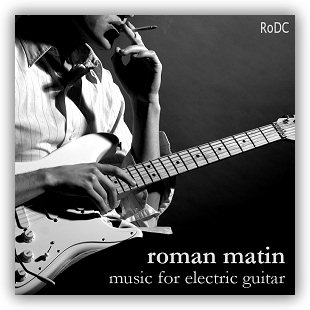|


RoDC
|
Roman Matin
Music For Electric Guitar
1 - Part 1 - Music Box - Part 2 - Incident

3 - Parts 4 - 6 - Rain - Bluebird - Toy Tune
4 - Part 7 - Tears In Heaven
5 - Parts 8 - 10 - Blues - Interlude - Breath
6 - Part 11 - Midnight
7 - Parts 12 - 16
|
"Music for Electric Guitar"
is the third album of Matin, and the first which is available for American
and European audience. The album is recorded for electric solo guitar.
The unique style of Russian guitarist should be noted right away. "Excellent
Classical / Compositional approach to playing Jazz Guitar" - classic jazz guitarist
Paul Metzke characterized Matin's music with these words and there is no
better description. All the plays on the disk are composed by Roman and perform
very original music, as if Erik Satie wrote his plays for electric solo guitar.
It is not surprising, that Anthony Coleman said about this music "It's
lovely... veiled and kind of Satie-esque". Polytonal and polyrhythmic technique
characterizes the album. Guitar sounds like a whole orchestra; the bass part harmoniously
fits into the musical narration, and constitutes an elastic platform.
This work can be described as extremely mature for the young guitarist.
"Music for Electric Guitar" is lyrical, beautiful and disturbing at the same
time, transmits complex world of human experiences. Short, concise but informative
piece flows into one another, music is changeable, but creates a single common mood
at the same time. Matin lyrical and even partly nostalgic. Permanent rustle
of vinyl records perfectly complements the slow majestic music, which reminds of
those times when "the criterion of beauty meant so much", as a musician remarked
in the interview.
Short plays in the album are grouped by two or three and the latter play,
the longest, consists of five parts. This music can be described by the words of
Denman Maroney about Matin's music "Toy Tunes".
Plays are very fragile indeed, like a toy, and there is definitely something fairy
in the music. The music of the album can be compared to Bela Bartok's Mikrokosmos
by the mood and compositional approach. The crystal-clear academic disciplined approach
and precludes the recurrence of unnecessary notes. The music can even be called
pedantic, but its jazz sentiments make it emancipated in spirit.
John Douglas
Insert an opinion
This page has 890 hits
Publishing Date: 02/11/2008

|
|

